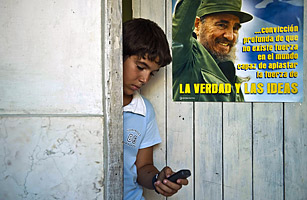
When Fidel Castro decided to officially hand over the reins of power in Cuba to his younger brother Raúl on Feb. 24, 2008, it would have been illegal for Fidel to notify him via commercial cell phone. Over the course of his half-century of rule, Fidel defended the restrictions he placed on Cuba's 11 million citizens by saying they were necessary sacrifices in the "battle of ideas" against enemy numero uno — the U.S. By the time mobile technology spread its networks throughout the interconnected world, it was just another innovation that wasn't destined to arrive on the communist island. Officially, that is. The thriving Cuban black market, facilitated by help from friends and family in Miami, and its pricey cell phones flew in the face of the Commandante's revolutionary rhetoric. So when Raúl consented to reality and had the cell-phone ban lifted on April 1, 2008, it was the first of several major modernizations he would usher in.